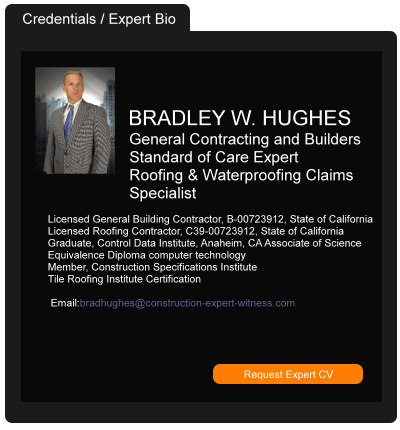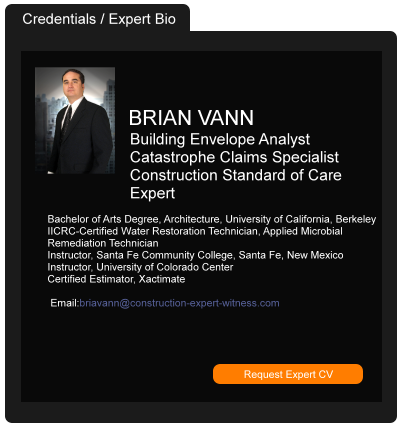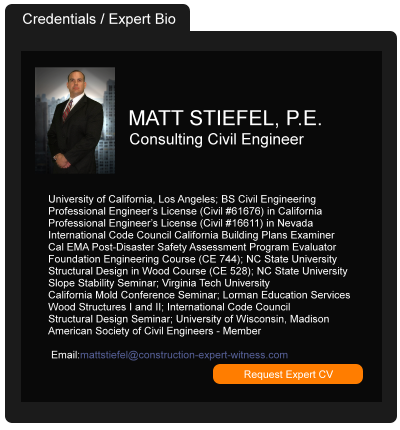Haight Welcomes Elizabeth Lawley
September 03, 2015 —
Elizabeth W. Lawley – Haight Brown & Bonesteel LLPHaight Brown & Bonesteel LLP welcomes partner Elizabeth W. Lawley. Elizabeth joins Haight’s new Sacramento office in the Construction Law and General Liability Practice Groups. She has extensive experience representing construction companies, contractors, subcontractors, real estate developers and insurers. Among her clients are prestigious national home builders, window manufacturers, roofers, HVAC, tile and masonry contractors. Elizabeth provides exceptional legal services while navigating complex litigation handling and resolution and she adds another layer of top-tier skills to Haight’s existing practice.
Haight Brown & Bonesteel LLP
2485 Natomas Park Drive
Suite 450
Sacramento, CA 95833
www.hbblaw.com
Read the court decisionRead the full story...Reprinted courtesy of
Elizabeth W. Lawley, Haight Brown & Bonesteel LLPMs. Lawley may be contacted at
elawley@hbblaw.com
More Musings on Why I Mediate
November 18, 2024 —
Christopher G. Hill - Construction Law MusingsWhew! I’m back. And yes, I know it’s been a while (it has been a busy year, both personally and professionally). Hopefully, this will be the first of at least a few more consistent posts here at Construction Law Musings. Now, on with the post:
Over the last few weeks, I’ve had a surge in mediation, both in my capacity as a mediator and as counsel for construction industry clients. These recent events have reaffirmed what I have always believed to be true, namely that no construction case is impossible to settle and avoid the cost and expense of litigation. I was also reminded of why I became a certified mediator and of the satisfaction that I get from helping individuals and construction companies find a business solution and closure.
Read the court decisionRead the full story...Reprinted courtesy of
The Law Office of Christopher G. HillMr. Hill may be contacted at
chrisghill@constructionlawva.com
Insured's Failure to Challenge Trial Court's Application of Exclusion Makes Appeal Futile
November 15, 2022 —
Tred R. Eyerly - Insurance Law HawaiiThe Texas Court of Appeals affirmed the trial court's granting of summary judgment to the insurer because the appeal failed to challenge the exclusion under which the insurer found no coverage. Sosa v. Auto Club Indemn. Co., 2022 Tex. App. LEXIS 6520 (Tex. Ct. App. Aug. 30, 2022).
Sosa's house was damaged during Hurricane Harry on August 26, 2017. Sosa filed a claim with Auto Club. She reported that two feet of floodwater had entered her home, her roof was missing shingles and was leaking, and she had sustained interior damage. An adjuster estimated the cost to prepare the roof damage was $1,191.96, less that her deductible. Auto Club determined that any remaining damage was caused by flood water, which was expressly excluded from coverage.
On November 11, 2020, Sosa filed suit against Auto Club for breach of the policy. Among other things, she argued the adjuster spent minimal time at her home inspecting and was inexperienced. In its answer, Auto Club asserted Sosa's claim was time-barred by the statute of limitations. Sosa then filed an amended complaint and changed the date of the loss from August 26, 2017, to June 28, 2019.
Read the court decisionRead the full story...Reprinted courtesy of
Tred R. Eyerly, Damon Key Leong Kupchak HastertMr. Eyerly may be contacted at
te@hawaiilawyer.com
Where There's Smoke...California's New Emergency Wildfire Smoke Protection Regulation And What Employers Are Required To Do
August 26, 2019 —
Michael Studenka – Newmeyer DillionCalifornia employers need to pay heed to the recently announced California Division of Occupational Safety and Health Standards Board (Cal/OSHA) emergency regulation related to their duty to protect employees from the potential harm caused by wildfire smoke. As of July 29, 2019, employers are required to actively monitor their local Air Quality Index (AQI) and take steps to protect their employees from the harmful particulate matter contained within wildfire smoke.
Which Workplaces Are Impacted?
The regulation applies to all workplaces exposed to wildfire smoke with an AQI level of 151 or greater (ranging from "unhealthy" to "hazardous"). "Exposed" workplaces are those that are not in enclosed buildings, structures, or vehicles with mechanical ventilation and the ability to close all windows and doors. Outdoor occupations including construction, agriculture, landscaping, maintenance, commercial delivery, and others that expose the worker to the outside air for more than one hour will be the most impacted by this new regulation, although firefighters engaged in fighting wildfires are expressly exempt from the statute.
What If I Have A Potentially Exposed Workplace?
Employers with outdoor workplaces that are exposed to wildfire smoke are required to monitor the AQI before each shift, and "periodically throughout the day," all to ensure that the Air Quality Index for PM2.5 (particulate matter with an aerodynamic diameter of 2.5 micrometers or smaller) remains below 151. This can be done by visiting certain governmental websites, including U.S. Environmental Protection Agency's AirNow website (www.airnow.gov), which allow for regular email alerts to be issued to the employer. An employer with a potentially exposed workplace must also set up a communication system capable of communicating to all affected employees (in a language readily understood) the status of wildfire smoke hazards. The communication system must also provide the employees a process to inform the employer of worsening air quality and/or any adverse symptoms that they may be experiencing (e.g., asthma or chest pain).
Finally, employers are required to add to their Injury and Illness Protection Program (IIPP) the provision of effective training and instruction (i.e., approximately 15 minutes) regarding:
- the health effects of wildfire smoke;
- the right to obtain medical treatment without fear of reprisal;
- how employees can obtain the current AQI for PM2.5;
- the requirements of this regulation;
- the employer's communication system regarding wildfire smoke;
- the employer's methods for protecting employees from wildfire smoke;
- the importance, limitations, and benefits of using a respirator when exposed to wildfire smoke; and
- the proper use and maintenance of respirators.
The Required Provision of Respiratory Protective Equipment
Employers with exposed workplaces are required to provide effective NIOSH-approved respirators (e.g., N95 filtering facepiece respirators) when AQI for PM2.5 levels are 151-200 (unhealthy), 201-300 (very unhealthy), or 301-500 (hazardous). The N95 respirator typically costs less than a dollar per mask and can be easily purchased online. Employers are also required to clean, store, and maintain these respirators for times of need. Employees are free to decide whether to use a respirator when the AQI for PM2.5 level is between 151-500, although employers must be prepared to offer the equipment at an AQI level of 151 or higher. Use of the respirator by an employee exposed to an AQI for PM2.5 level that exceeds 500, however, is required by law.
What Should Potentially Exposed Employers Do Now?
Employers should immediately begin supplementing their IIPP platforms to include this regulation's prescribed training regarding wildfire smoke. Companies should also develop an adequate monitoring and communication plan regarding wildfire smoke hazards and effectively train their supervisors on the same. Finally, acquiring an adequate supply of N95 filtering respirators now will help ensure that employers are prepared for the next wildfire.
Michael Studenka is a partner in Newmeyer Dillion's Labor & Employment practice group. His practice focuses on the life cycle of Employment law. Mike advises and trains companies on proactive measures to keep them protected and in compliance, and leverages his significant trial experience when faced with litigation. You can reach out to him at michael.studenka@ndlf.com.
Read the court decisionRead the full story...Reprinted courtesy of
The California Privacy Rights Act Passed – Now What?
November 09, 2020 —
Heather Whitehead - Newmeyer DillionThe ballot initiative, Proposition 24, has been passed by voters in yesterday’s election. What does this proposition entail and how does it impact the California Consumer Privacy Act (CCPA)?
What’s Covered in Proposition 24 - The California Privacy Rights Act (CPRA)
The CPRA, among other things, does the following:
- Revises the existing CCPA to expand consumer rights with respect to personal information and sensitive personal information;
- Creates a new agency responsible for enforcing the CPRA; and
- Increases penalties for violations related to the personal information of children under the age of 16.
As for additional consumer rights, the CPRA offers consumers the opportunity to request a correction of inaccurate personal information. In addition, a consumer may direct a company to “limit its use of the consumer's sensitive personal information” to a use that an average customer would expect.
Read the court decisionRead the full story...Reprinted courtesy of
Heather Whitehead, Newmeyer DillionMs. Whitehead may be contacted at
heather.whitehead@ndlf.com
Seller Faces Federal Charges for Lying on Real Estate Disclosure Forms
October 02, 2015 —
Beverley BevenFlorez-CDJ STAFFHomeowners Glenn and Kathryn Jasen allegedly mislead buyers Kelly Magbee and family when they checked “no” on questions regarding sinkhole activity on real estate disclosure forms, according to On Your Side News. Furthermore, “Citizens Property Insurance Co. failed to file a sinkhole certification on a Spring Hill home in 2009. The company slipped the form into county records five years later- in Sept. 2014 – after questions from 8 On Your Side.”
If the insurance company had filed the sinkhole documentation, then the Magbees would have been told about the sinkhole prior to the purchase of the home. According to On Your Side News, Magbee and family moved out of the home “after a crack opened in the living room.”
Read the court decisionRead the full story...Reprinted courtesy of
Celebrating Excellence: Lisa Bondy Dunn named by Law Week Colorado as the 2024 Barrister’s Best Construction Defects Lawyer for Defendants
October 28, 2024 —
David M. McLain – Colorado Construction LitigationWe are thrilled to announce that our very own Lisa Bondy Dunn has been recognized by Law Week Colorado as the 2024 Barrister’s Best Construction Defects Lawyer for Defendants. This prestigious accolade is a testament to Lisa’s dedication, expertise, and unwavering commitment to achieving the best outcomes for our clients.
Lisa, a Partner at Higgins, Hopkins, McLain & Roswell (“HHMR”), has long been a leader in construction defect litigation, defending builders, contractors, developers, and design professionals in Colorado’s complex legal landscape. Her deep understanding of the industry and her relentless pursuit of practical, cost-effective solutions have earned her the respect of peers, clients, insurers, mediators, arbitrators, and courts alike.
As noted by Law Week Colorado: “For over two decades, Lisa Dunn has represented developers, contractors and subcontractors in construction-related disputes. Dunn has spoken across the country on construction and insurance matters, and she’s worked on several appellate cases during her career. She’s admitted in four states, and has consulted and represented some of the nation’s largest builders.”
Read the court decisionRead the full story...Reprinted courtesy of
David McLain, Higgins, Hopkins, McLain & Roswell, LLCMr. McLain may be contacted at
mclain@hhmrlaw.com
Jason Smith and Teddie Arnold Co-Author Updated “United States – Construction” Chapter in 2024 Legal 500: Country Comparative Guides
May 28, 2024 —
Jason Smith & Edward (Teddie) Arnold - The Construction SeytJason Smith and
Teddie Arnold, partners in Seyfarth’s Washington, DC office, have co-authored an updated “United States – Construction” chapter in the 2024 edition of The Legal 500: Country Comparative Guides. Seyfarth continues to participate as an exclusive contributor for this comprehensive overview of construction-specific laws and regulations in the United States. Topics covered include, but are not limited to, requirements and obligations, permits and licencing, procurement, financing and security, and disputes, as well as insight and opinion on current challenges and opportunities. To access and download a copy of the chapter, click
here.
Reprinted courtesy of
Jason N. Smith, Seyfarth and
Edward V. Arnold, Seyfarth
Mr. Smith may be contacted at jnsmith@seyfarth.com
Mr. Arnold may be contacted at earnold@seyfarth.com
Read the full story... Read the court decisionRead the full story...Reprinted courtesy of


































































